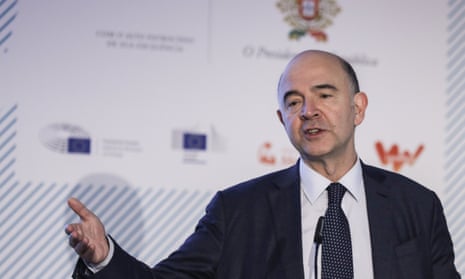The UK will never be granted a free trade agreement with the European Union if it seeks to take advantage of Brexit by setting itself up as an offshore tax haven for businesses and the wealthy, the EU economic affairs commissioner has warned.
Pierre Moscovici also warned that UK tax jurisdictions such as Jersey could find themselves moved from an EU grey list to its black list if they fail to comply with EU standards on exchanging tax information. The black list was set up earlier this month, and Moscovici is still urging the EU to set out clear sanctions to enforce compliance.
“We will check and if their commitments are not serious they will be put on the black list in six months,” he said. “Thereafter we will change the list once a year.”
He warned the UK not to think that outside the EU it could set itself up as a tax haven. Referring to OECD-led agreements on tax information exchange known as base erosion profit shifting (BEPS), he said “When we negotiate a free trade agreement I think we can, and we should, involve in the negotiation the need to fulfil the international global standards agreements. We should not conclude any kind of free trade agreement that is not BEPS-compatible”.
BEPS is a broad initiative largely driven through the G20 to force countries to fill tax loopholes that allow multinationals to shift profits to minimise tax.
Moscovici’s remarks, made at a Global Counsel lunch, underline the EU’s determination to use talks on a free trade deal to frustrate the vision of a deregulated Britain promoted by some Brexit supporters.
Nevertheless, the UK, he stressed, would be capable outside the EU of setting its own corporate and individual tax rates since this was a matter of national sovereignty. But he warned that if the UK followed Ireland by cutting its corporate tax rates, it was likely “to weaken its economy without getting all the benefits it expects”.
Moscovici said he expected the UK to co-operate in agreeing to plans for taxing the digital economy by this summer. The effective tax rate of the digital economy was 9% on average, he said, and more than 23% for the rest of the economy.
In the aftermath of the Guardian’s Paradise Papers revelations, he also said the EU was also setting out plans so intermediaries – who could be bankers, lawyers or tax advisers – are required to make public what they advise their clients on aggressive tax evasion.
He insisted, thanks to the work of journalists and NGOs, “the wind has changed since 2012 – there is a tremendous push to transparency in tax affairs”.
Moscovici was in London for talks with the chancellor, Philip Hammond. Responsible for tax and economic union, he is pushing an ambitious agenda in his final full year as a commissioner, warning that the defeat of tax evasion lies at the heart of a wider war to defeat populism in Europe.
A member of the French Socialist party, he said the EU had recovered politically and economically in 2017 after being under siege from populist forces in 2016. But he said the war against nationalist populism was far from over, pointing to the involvement of the extreme right in Austrian government, and the threat to stability posed by the Italian elections in March.
He said populism was fed by those that felt the rules that did not apply to everyone, and shared prosperity was a myth. “The string of tax scandals had created revulsion and forced policymakers in the EU to get out of their comfort zone,” he said.
